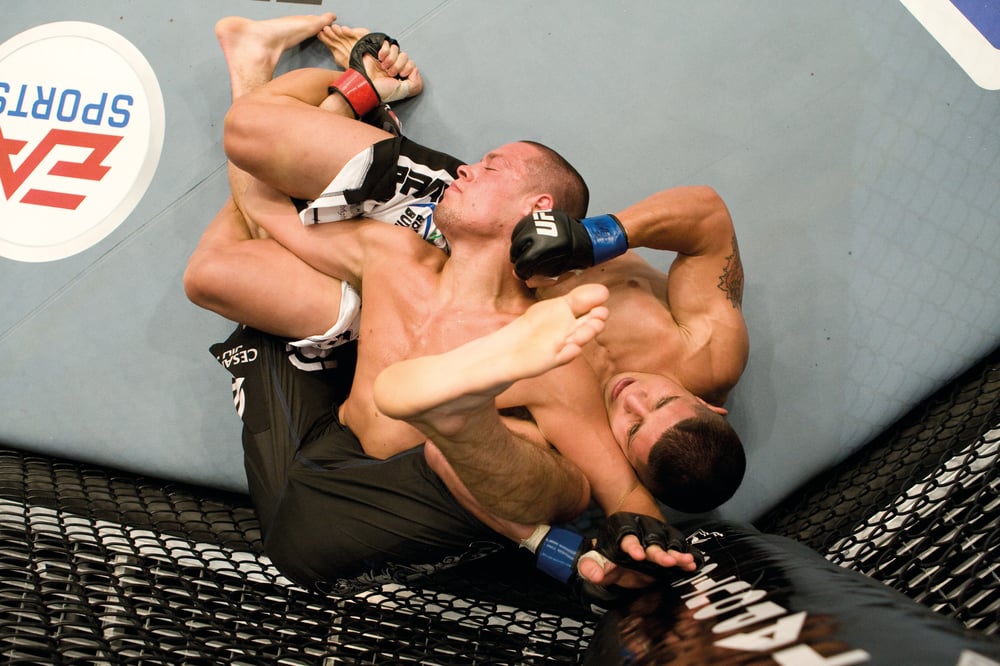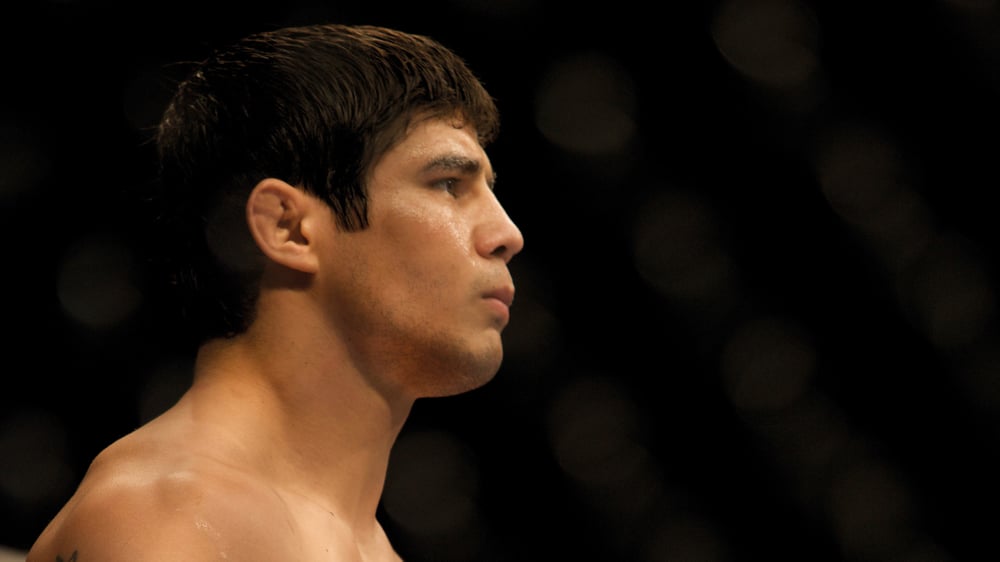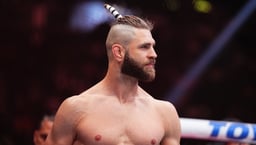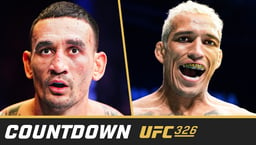
Issue 054
September 2009
If there’s one word that best describes Joe ‘Daddy’ Stevenson, it’s ‘tough’.
The lightweight standout has taken on all forms of adversity, both inside and outside the Octagon, yet he just keeps on coming. The words ‘stop’ and ‘quit’ simply do not exist in Stevenson’s vocabulary, no matter how many twists and turns his MMA career might take.
With the help of his new trainer, Greg Jackson, The Ultimate Fighter Season 2 winner hopes to climb his way back up the UFC lightweight rankings, and prove to the world that he shouldn’t be written off (or labeled a divisional gatekeeper) just yet.
Most fans were unfamiliar with Stevenson before 2005’s second season of TUF, but the native Californian was already a well-respected fighter with an impressive 24-6-0 professional record and tilts against the likes of Jens Pulver, Thomas Denny and Jeremy Jackson. Unknown to most, the father of four started his profession career at the tender age of 16 and has been competing for nearly 11 years, making him a grizzled veteran at just 27 years of age.
“It was really different in the early years,” says Stevenson. “I received my parents’ consent and started fighting at 16, which is odd when I think of it now, because they wouldn’t let me play football. Looking back, I was really thrown into the fire. Sometimes I think I should have gotten a good manager, taken it a bit slower.
But at the end of the day, would I have done it the same way again? Absolutely!”
Stevenson was arguably the most experienced welterweight contestant going into his season of TUF, holding both the King of the Cage lightweight and Gladiator Challenge welterweight titles. Despite annihilating all opposition and winning the UFC contract, the Californian experienced an unexpected loss to Josh ‘The Dentist’ Neer in his first true UFC fight. It marked the end of a nine-fight win streak, and his last bout at 170lb.

Following the defeat, Stevenson dropped to lightweight, where over an 18-month period he devastated the division, mowing through Yves Edwards, Dokonjonosuke Mishima, Melvin Guillard and Kurt Pellegrino, before battling BJ Penn for the 155lb belt. The fight was one of the bloodiest in UFC history, with Penn landing a brutal elbow to Stevenson’s head, causing a deep cut. Despite his best efforts, Stevenson succumbed to a rear naked choke in the second round. While clearly outclassed, the battle was nonetheless a testament to Stevenson’s resilience.
The lightweight standout returned to the Octagon six months later, where he defeated Gleison Tibau before hitting a two-fight-losing streak and taking a big hit in the rankings. With back-to-back losses against Kenny Florian and Diego Sanchez, some fans began writing off the former title contender, claiming that his best days were behind him. For Stevenson, it was a perfect time for a change in scenery.
Even with a decade of fights under his belt, Stevenson felt he had a lot to learn, hence his decision to leave Cobra Kai, in Las Vegas, behind and head to Albuquerque, New Mexico, to train with Greg Jackson. Home to the likes of Georges St Pierre, Rashad Evans and Keith Jardine (among others), Jackson’s is regarded as one of the best MMA gyms in America.
“I needed to reinvent myself,” says Stevenson. “And Jackson’s was the place to do it. Greg showed me that I’ve got lots of room to improve. I just needed to enter an environment where I felt out of touch, a place outside my comfort zone. My time there was great, really well spent – a great move for my career.”
Stevenson’s new training partners include WEC standouts Donald Cerrone and Leonard Garcia, as well as a stable of top UFC fighters. The recently anointed Brazilian jiu-jitsu black belt credits his time at Jackson’s as the main reason he beat TUF Season 5 champion, Nate Diaz, in his most recent Octagon appearance.
“They’ve given me a different outlook on the way I fight,” says Stevenson. “It’s the little quirks that have made a huge difference – the things having to do with how to execute the game plan, and when to execute it. Greg is an excellent strategist, and a great guy.”
The victory brought an end to Stevenson’s losing streak, and marked a new beginning for the father of four, who is looking to retake his rightful place at the top of the UFC 155lb division. “I belong at the top of my weight class,” says Stevenson. “But my new reality is really simple: any fight in front of me is a pivotal fight. From now on I’ve got to focus on the fight that’s right there. If I start thinking of the bigger picture and where I fit in, I’ll get distracted. From now on, it’s one day and one fight at a time.”
Positive pressure seems to be a big theme for Stevenson. The lightweight admitted before his most recent fight that he was worried that three losses in a row would mark the end of his UFC career. Luckily, Stevenson found a way to use those negative thoughts to his advantage. “There was a bit of worry,” says Stevenson. “There was a ton of pressure, because you start thinking about worst-case scenarios. But in the end, the pressure helped. You learn to use those thoughts to fuel you. You make them into something positive.”
He may have a new training environment and a new attitude, but it doesn’t mean we’ll stop seeing parts of the old Joe Stevenson. For one, the Californian assures his fans that his signature guillotine choke is still very much alive and well. The lightweight has successfully ended three UFC contests with that particular submission, the most recent being at UFC 86 against Gleison Tibau. Stevenson also has no plans to change his exciting style. Win or lose, fans will be hard-pressed to find a boring Joe Stevenson fight, in fact, the former King of the Cage champion brought home ‘fight of the night’ honors in his last two performances.

“I’m glad I’m seen as exciting,” says Stevenson. “But honestly, I don’t go for the bonuses. The most important thing for me is the ‘W’. I know a lot of guys who make it a point to take home bonuses, usually because they need the money. Financially, I’m not worried anymore. Even if I’m not fighting in the UFC, I know I can support my family.”
With a fresh, new perspective towards his career, Stevenson is sure to surprise the naysayers in future bouts. But as a dedicated family man, Stevenson admits the changes have been difficult to implement. Training in Albuquerque means being away from his family, and that’s something he has always struggled with. “Being a fighter’s a lot harder than anyone thinks,” says Stevenson. “I hate being away from my family, but it’s something I’ve got to do. It’s a sacrifice I’ve got to make if I want to get the best training possible.” It’s also a sacrifice that Stevenson hopes his children will never have to experience. “I don’t want them to follow in Daddy’s footsteps,” says Stevenson. “It’s hard to have a healthy family life as a fighter. I want them to do whatever they want, as long as they love it. Right now, my three-year-old is awesome at making paper airplanes. And you know what? They’re the best paper airplanes in the whole world.”
Untapped potential, youth, a positive attitude, a great camp, and over 10 years of experience – these are all things that Stevenson has going for him. As long as he can stay injury free, the Californian native has years before he reaches his peak. The competition at lightweight may be tough, but Stevenson’s future could very well be a bright one. He’s been at the top before, and he knows what it takes to get there again. “In three years I’ll be defending my UFC lightweight title,” says Stevenson. “After that I want to settle down and start coaching. I absolute love it, and it’s something I’m good at. I love this sport and I want to continue to be involved in it, even after I’m done being a fighter.”
In the meantime, the newly upgraded Joe Stevenson 2.0 has a division to climb, and a couple of losses to avenge. Improvements were apparent in his last bout, but the team Jackson fighter assures fans that they haven’t seen anything – the best is yet to come.
“Everything happens for a reason,” says Stevenson. “People have been asking me why I haven’t made these changes earlier, why I didn’t switch camps ages ago. I believe things we’re supposed to be this way. When I look back, or when my kids look back, we’ll smile. I’m glad things went the way they did, without all those experiences I wouldn’t be the person I am today.”










